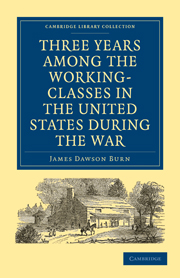Book contents
- Frontmatter
- Contents
- PREFACE
- CHAPTER I THE AMERICAN PEOPLE
- CHAPTER II THE LABOURING POPULATION—IRISH AND GERMANS
- CHAPTER III THE PRESS—ADMINISTRATION OF JUSTICE—PUBLIC OPINION
- CHAPTER IV RELIGIOUS AND MORAL CHARACTERISTICS
- CHAPTER V THE WOMEN OF AMERICA
- CHAPTER VI THE CITIES OF AMERICA—NEW YORK
- CHAPTER VII THE STEAMBOAT AND RAILWAY SYSTEM OF AMERICA—STREET TRAFFIC
- CHAPTER VIII EDUCATION—THE FREE-SCHOOL SYSTEM
- CHAPTER IX BUSINESS
- CHAPTER X MINERAL WEALTH OF THE COUNTRY
- CHAPTER XI THE LATE CIVIL WAR
- CHAPTER XII SANATORY FAIRS AND CHARITIES
- CHAPTER XIII POLITICAL CONDITION OF THE PEOPLE
- CHAPTER XIV COMMISSIONERS OF EMIGRATION—CASTLE GARDEN, NEW YOEK
- CHAPTER XV ADVICE TO INTENDING EMIGRANTS
CHAPTER X - MINERAL WEALTH OF THE COUNTRY
Published online by Cambridge University Press: 29 August 2010
- Frontmatter
- Contents
- PREFACE
- CHAPTER I THE AMERICAN PEOPLE
- CHAPTER II THE LABOURING POPULATION—IRISH AND GERMANS
- CHAPTER III THE PRESS—ADMINISTRATION OF JUSTICE—PUBLIC OPINION
- CHAPTER IV RELIGIOUS AND MORAL CHARACTERISTICS
- CHAPTER V THE WOMEN OF AMERICA
- CHAPTER VI THE CITIES OF AMERICA—NEW YORK
- CHAPTER VII THE STEAMBOAT AND RAILWAY SYSTEM OF AMERICA—STREET TRAFFIC
- CHAPTER VIII EDUCATION—THE FREE-SCHOOL SYSTEM
- CHAPTER IX BUSINESS
- CHAPTER X MINERAL WEALTH OF THE COUNTRY
- CHAPTER XI THE LATE CIVIL WAR
- CHAPTER XII SANATORY FAIRS AND CHARITIES
- CHAPTER XIII POLITICAL CONDITION OF THE PEOPLE
- CHAPTER XIV COMMISSIONERS OF EMIGRATION—CASTLE GARDEN, NEW YOEK
- CHAPTER XV ADVICE TO INTENDING EMIGRANTS
Summary
I believe there is not another State in the Union which possesses such unbounded wealth as is to be found in the large coal-fields and other mineral material which lie under the soil of Pennsylvania. These coal-fields are the more valuable to their proprietors from the fact of being the only resource of the people on the east of the Alleghany Mountains. The immense fields of coal in the West are of little present value or importance for purposes of trade; but should the Southern States ever become an independent nationality, they would become a source of inexhaustible wealth, as the Western States, whose produce is now to a certain extent landlocked, would certainly ally themselves with the nation having the command of the great inland American highway, the Mississippi. The fact is, if it were not for this river and its tributaries, much of the great grain-producing region would be little better than a hunting-ground for the native Indians. There are two cities in the West, one in Ohio, Cincinnati—and the other, Chicago, in Illinois—whose leading business furnishes an excellent proof of the productive character of the country. In 1861-2, 1,532,942—no, sir, not bushels of corn—but that number of pigs were killed, cured, and prepared for the market.
Certain districts in the upper part of Pennsylvania and the western parts of Virginia have been the means of producing an extraordinary amount of excitement in the minds of a very large number of the American people. A few years ago the speculative portion of society in Great Britain were seized with the railway mania, and thousands were ruined, after which the world went on as usual.
- Type
- Chapter
- Information
- Publisher: Cambridge University PressPrint publication year: 2009First published in: 1865



